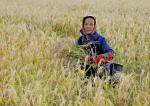News
2017-08-09 | permalink
Indigenous peoples are the best guardians of world’s biodiversity, UN expert
 Apatani woman (Photo: Global Landscapes Forum, bit.ly/Apatani, bit.ly/ccby_20)
Apatani woman (Photo: Global Landscapes Forum, bit.ly/Apatani, bit.ly/ccby_20)
When indigenous peoples’ rights to their lands are protected, they are the best guardians of the world’s forests and biodiversity. However, indigenous peoples are facing acute challenges due to the loss of their lands and the violation of their rights. This is the message of Victoria Tauli-Corpuz, the United Nations Special Rapporteur on the rights of indigenous peoples, to mark the International Day of the World’s Indigenous Peoples on 9 August. It is now 10 years since the UN Declaration on the Rights of Indigenous Peoples was adopted by the UN General Assembly in 2007, but indigenous peoples still face discrimination, exclusion and lack of protection, the UN expert has warned. Even though the Declaration is the most comprehensive international instrument on indigenous peoples’ collective rights, including the rights to self-determination, traditional lands and culture, the lack of implementation remains a major problem. “Indigenous Peoples are still forced from their lands for development and conservation projects, and still face violence and criminalisation when they stand up for their rights,” Victoria Tauli-Corpuz told the British newspaper The Guardian.
It is estimated that there are more than 370 million indigenous people spread across 70 countries worldwide. The United Nations warn that they still suffer from racism, discrimination, and unequal access to basic services including healthcare and education. Where statistical data is available, it shows clearly that they are facing disproportionately higher levels of poverty, lower life expectancy and worse educational outcomes. Indigenous peoples are particularly threatened by the loss of their lands and the violation of their rights over resources, which are pillars of their livelihoods and cultural identities. “Many indigenous communities face intractable poverty despite living on resource-rich lands because their rights are not respected and their self-determined development is not supported,” says Tauli-Corpuz. “Protecting the rights of indigenous women, who are often responsible for both their communities’ food security and for managing their forests, is particularly important.”
According to the Special Rapporteur, the biggest threats are extractive industries, conservation projects and climate change. “Many Indigenous Peoples live on resource-rich territory - in large part because they have protected and preserved that land for generations - making them prime targets for both extractive industries and protected areas.” Tauli-Corpuz criticises that international law still heavily privileges investors and companies despite the fact that the UN Declaration has been accepted as an international norm. “Many Indigenous Peoples are still being dispossessed of their lands by states and corporations, and are being criminalised and assassinated when they fight to protect their lands from being grabbed and polluted by mining and oil companies,” she added. Individuals and communities who dare to defend indigenous rights are labelled as obstacles to progress, anti-development forces, and in some cases, even enemies of the State or terrorists. Tauli-Corpuz also told the Guardian that even projects that are planned as solutions to climate change can sometimes threaten indigenous land rights. “Protected areas are still being established on indigenous lands without their consent, even though indigenous peoples are the proven best guardians of the forest and forcing them from their lands does not improve environmental outcomes,” she said. This view is backed by studies which show that where Indigenous Peoples have secure rights to their lands, carbon storage is higher and deforestation is lower. (ab)
- OHCHR: World still lagging on indigenous rights 10 years after historic declaration, UN experts warn
- The Guardian: ‘Indigenous peoples are the best guardians of world's biodiversity’
- UN News Centre: Protecting indigenous peoples' rights 'is protecting everyone's rights'
- Food Tank: Celebrating International Day of the World’s Indigenous Peoples

